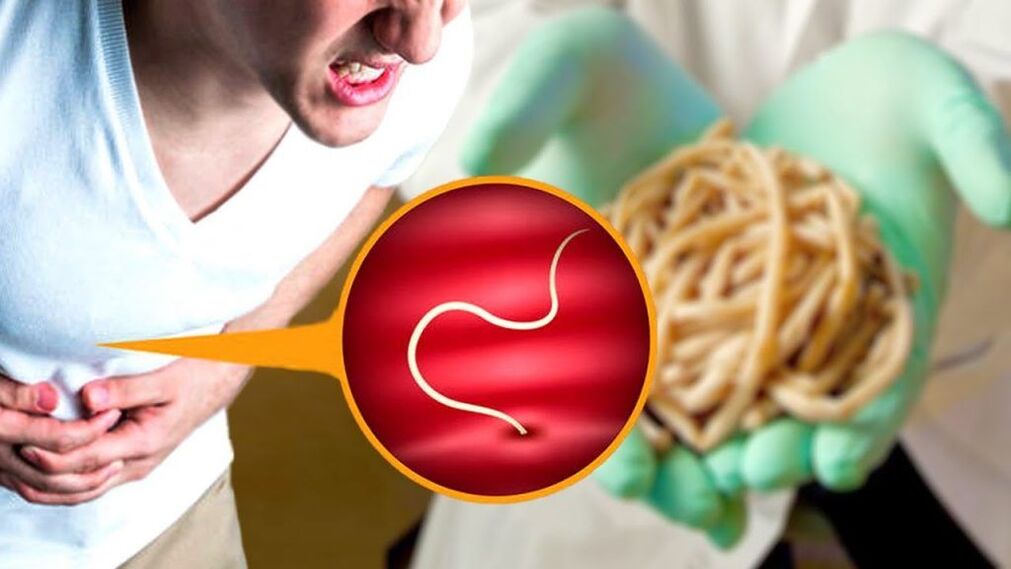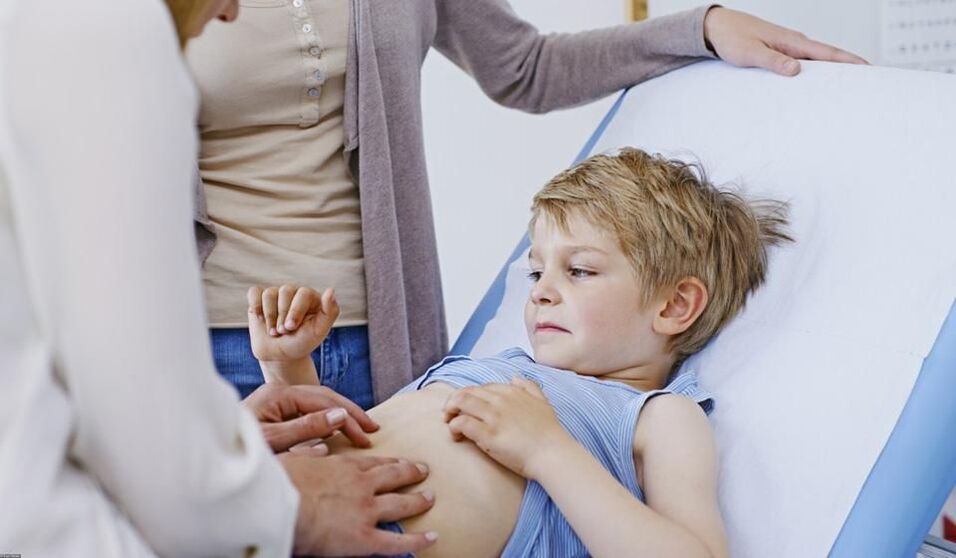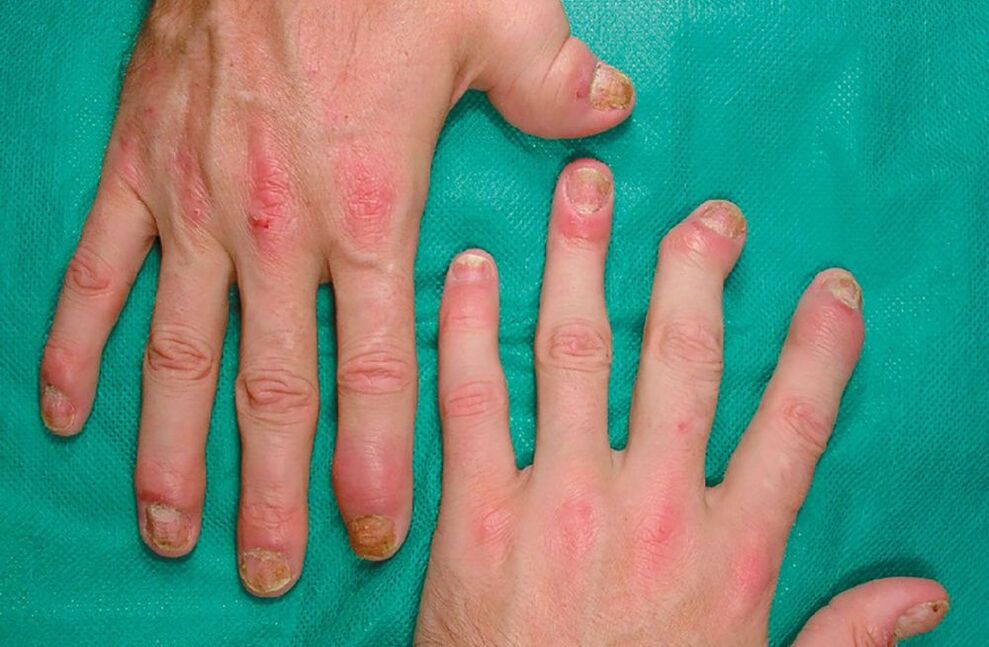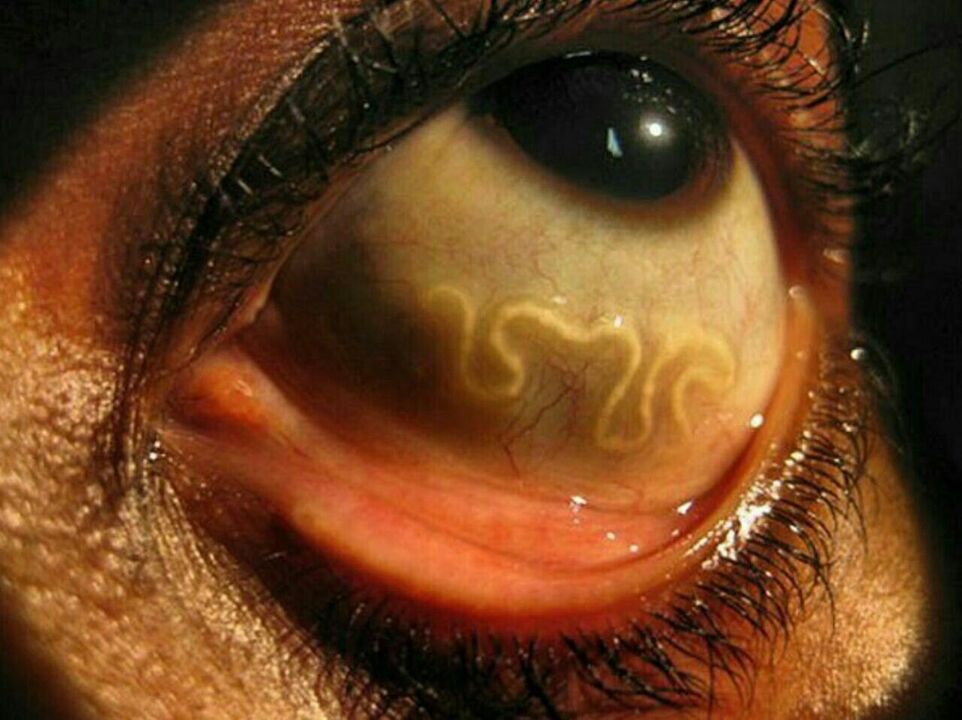
Helminths are a common problem in some categories of the population. In children, as a rule, parasitic pinworms, in people who often consume fish, diphyllobothriasis is diagnosed, and trichinosis is common among hunters.
The fact that human worms provoke the development of many diseases which, apparently, have nothing to do with helminthiasis, is currently confirmed by a wide variety of studies. In particular, there is a theory that helminth diseases are associated with the development of oncological processes.
Also, you should be aware that if there are helminths in the body, this does not mean that the patient will show symptoms of such an infection. Signs of their presence can be masked by other disorders of the liver, gallbladder, gastrointestinal tract. As a result, a person can use different means for a long time and not detect infection. And after selecting the correct anthelmintic treatment scheme for the patient, the disease can be cured. Therefore, asking yourself questions: "What should I do if I have helminths, how to check for parasites and will I infect my loved ones? ", You should not be afraid to contact the doctor and get all the answers, and also find out what to do if you are wormed.
For answers to questions about what worms are, how dangerous are these parasites, and how not to get infected with different types of parasites, read the article below. We will also talk about what are the signs of worm infection, both general and specific.
How can you get helminths?

Helminth eggs can enter the human body in several ways. There are four main ways of infection:
Biohelminthiasis. Worms are found in raw or poorly thermally processed meat, as well as in fish. You can get infected by consuming lard, barbecue, dried fish, sushi, etc.
Geoelminthiasis. Ripe helminth eggs found in soil and water enter the body. In this environment they are found, and since human feces, in addition to animal feces, get there. Also, infestations occur when a person comes into contact with animals, for example by constantly removing cat or dog feces, as well as when food is contaminated with fly eggs.
Contact. The most common worms, pinworms, are passed from person to person. In this case, the risk of getting this disease is the highest.
A number of parasites can enter the body when insects bite a person.
Trying to find an answer to the question of what causes worms and how they are transmitted, it should be taken into account that the main route of infection with parasites is fecal-oral. That is, a person simply swallows the eggs of worms when eating food, drinks water. In more rare cases, worms in a person are found after the bites of insects that have become infected.
Worm infection through the soil
After contact with earth, sand, etc. , it is necessary not only to wash your hands very well, but also to clean your nails. It is better for children to cut their nails very short. All vegetables growing in the soil should be washed very carefully and, if possible, scalded with boiling water.
Animals and flies
Wikipedia shows that worm eggs can appear in the house and from pets: cats, dogs walking on the street. There is a high risk of infection if children play with such animals. Therefore, immediate action should be taken if it is suspected that worms have formed in cats. Symptoms and treatment of infection in animals can be obtained from a veterinarian or watch the corresponding video on the network. In this way, any type of worm can appear in the body. Therefore, the answer to the question of whether they are transmitted from a dog to a person and whether it is possible to get infected with a dog is unequivocal: yes, it is possible.
Another helminth vector is flies. They can initially land on feces, livestock waste, then fly and land on food. As a result, they spread helminth eggs and people develop helminth disease after infection.
How are worms transmitted from person to person?
How can you get pinworms and are these parasites passed from person to person? The answer to this question is simple: if a female pinworm crawls out of the intestine along the rectum into the baby's papa at night, she can lay large numbers of eggs near the anus - up to 5000 pieces. As a result, severe itching occurs, the baby itches, and eggs fall on her hands. In addition, from the hands of the baby, the eggs fall on clothes, sheets and other objects that the baby touches. It is clear how the worms are transmitted further: other children and adults become infected with the eggs, after which small white pinworms multiply in the body. That is why it is very important to wash your hands before eating, after returning home from public places.
Infection through water

Many parasite eggs are found in open water bodies and well water. That is why people who use such water should use a special bactericidal filter. It is also very important to boil the water that people drink and eat the dishes prepared with it. It is very dangerous to swallow water from tanks.
It should be taken into account, talking about what a helminthic invasion is, that this is a disease that mainly affects children, as they are very susceptible to helminthiasis. The fact is that in children, protective barriers are not yet developed to the same extent as in an adult, their stomach acid is lower.
In addition, signs of the presence of worms in a child very often appear due to the fact that young children, in the process of dominating the world, savor everything that comes within reach. Therefore, parents very often notice the symptoms of helminthic invasion in children, in particular, itching of the anus, poor appetite, cough in children during infection, etc. However, it is impossible to accustom the child to strictly follow the rules of hygiene in the first years of his life. Therefore, at this time, the risk of infection is high for all family members.
Speaking of egg worms - what is and how to treat this disease, it should be remembered that worms do not multiply in the human body. Worms in the human body die over a certain period of time. For example, pinworms live for several weeks, nematodes - about a year. The eggs that adult parasites lay in the body will certainly leave the intestines - either when the baby's feces or poop come out, or when they land on the skin near the anus, as happens with pinworms. When eggs are outside the human body, they mature in the external environment, after which they enter the human body again and again parasitize on it.
Since the reproduction of worms does not occur in the body, a large number of helminths are observed only if reinfection occurs, if the eggs enter the body again through the mouth.
Therefore, if reinfection does not occur, the pinworms that live in the body die in about 4 weeks. And if you follow all preventive measures very carefully, you can get rid of the presence of worms without treatment. However, in the case of children, observing all these rules is a very difficult task.
Signs of helminths

When infected with parasites, some early symptoms of worms appear in humans. About what symptoms appear with worms in case of infection, you can learn in detail from a specialist. But some signs of worms in humans can be seen on their own.
Hence, the most striking sign that a parasite infection has occurred is the presence of severe weight loss. In addition, the patient's skin becomes pale - this is how anemia manifests itself. On the surface, signs of the presence of helminth invasion are also displayed: a person looks exhausted, his level of fatigue may increase.
Helminths cause itching in the anus if the intestines are infected. However, they can also parasitize in other organs: in the lungs, liver, bladder and even the arm or leg, etc.
However, all the symptoms of parasites in the human body listed above are only the first general signs of infection that develop when the body is severely damaged by worms and allow you to recognize that something is wrong with your health. There are other more specific symptoms of helminth invasion in adults. The patient can perceive them as a manifestation of other diseases. At the same time, he can cure such diseases for a long time, of course, without success. This lasts until the exact cause of such symptoms is determined - helminthiasis. More details on this can be found in the corresponding videos on the network.
What are the symptoms of worms in an adult and can they occur in a child?
Digestive disorders
If the parasites are localized in the intestines and not in other organs, then the main signs in an adult and a child are a violation of the digestive function. A person may be disturbed by constant diarrhea or constipation, periodically manifested by nausea, vomiting, pain in the stomach, pain in the right hypochondrium, near the navel, intestinal disorders. If intestinal parasites are eliminated, flatulence often worries.
All of these signs can be both strong and weak, both long-term and periodic. It all depends on the severity of the infection. There are types of helminths that produce hormone-like substances, under the influence of which permanent diarrhea develops. If large worms grow large (like a tapeworm), they block the intestines and cause constipation.
General malaise, nervous system disorders
Worms live and secrete very large amounts of toxic substances, regardless of whether the parasites live in the blood, liver, lungs of a person. The more massive the infection, the more pronounced the signs of intoxication of the body, which adversely affect the nervous system.
As a result, headaches, dizziness and nausea develop. Some people mistake such signs for developing a migraine and, as a result, drink pain relievers.
Sometimes, when infected with parasites, the temperature rises, the pains in the joints are annoying. In addition, helminthic lesions result in a deficiency of vitamins and nutrients in the body. This phenomenon, as well as the depression of the nervous system, leads to the manifestation of chronic fatigue syndrome. The patient feels tired, worried about drowsiness, a feeling of weakness in the body. If we are talking about a child, he is bad, constantly nervous. Young children have disturbed sleep, cry or scream at night. School-age children, due to inattention and fatigue, can study poorly.
Allergies and skin manifestations

Signs of helminths Worms cause deterioration of the skin. Toxins with which worms infect the body negatively affect its general condition and can provoke the manifestation of various reactions on the skin. Rashes appear as a result of the release of histamine from mast cells and the accumulation of the liquid part of the blood in the tissue with the elevation of the epidermis.
These same reasons lead to the development of allergic reactions. In particular, itching, red spots, acne, urticaria, dry cough, allergic rhinitis, manifestations of bronchial asthma may appear. Also, if infected, the nails can exfoliate, brittle hair is noticed, and cracks appear on the heels.
Deterioration of immunity and infectious diseases
As worms feed in the body, they secrete toxic waste products. The toxic effect, a decrease in vitamins and minerals in the body leads to the fact that the immunity of the infected person deteriorates significantly. As a result, the state of health in chronic diseases also worsens, inflammatory processes in the nasopharynx begin to disturb: sinusitis, stomatitis. In women and girls, vulvovaginitis, bacterial vaginosis are possible. There is evidence that with prolonged pinworm infection, the development of inflammation of the appendages is possible. In this case, it is very important to detect their presence in a timely manner. Parasites in the liver also cause bad breath, a persistent bad taste.
There is also an opinion that worms in a person provoke the appearance of snoring and nocturnal grinding of the teeth. However, this relationship has not yet been proven.
Where do parasites live in the human body?

The types of parasites in the human body are determined depending on where exactly they live in the body. How to determine the presence and how to remove parasites from the body depends on their type.
translucent
These worms mainly inhabit the intestine, living in its various departments. Hookworms, roundworms, large tapeworms and other tapeworms are localized in the small intestine. In the small intestine live pygmy tapeworms, pinworms, in the large intestine - whipworms. In total, there are about a hundred types of cavity parasites. Pictures and images can be found online.
tissue
These types of worms in humans do not live in the intestine, but in organs and tissues. There are varieties that live in the brain (cysticercosis), liver (echinococcosis), lungs (paragonimiasis), muscles, lymphatics (filariasis) and other helminths.
What are still worms in a person, you can find out from a specialist.
Roundworm is a species that belongs to both luminal parasites and tissues, since in the first stage of their development they can move through the blood and infect any organ. How to get rid of roundworm, the doctor who prescribes the treatment regimen for infection with such parasites will tell.
The appearance of worms in humans can be found by looking at the picture of the corresponding type of parasites. Special literature shows what worm eggs look like.
Signs of infection depending on the type
How worms manifest themselves and how dangerous they are depends on the type of parasites, where they live exactly in the body they live in, and also on the intensity of the infection. Signs of invasion in humans can be detected after a few days. For example, if roundworms appear, health deteriorates after 2-3 days. In case of infection with other types of helminths, the first signs are noticed in the patient after 2-3 weeks. The incubation period for heartworm is 6 to 18 months.
Intestinal worms are dangerous from the point of view that if there is only one individual in the intestine, it is impossible to understand that a person is infected, as there are no signs. Some symptoms may only be bothersome if the worms are long (roundworm, broad tapeworm, etc. ) or a massive infection has occurred. Almost all helminthiases are accompanied by headache, fatigue, dizziness, irritability.
What are worms like, what are they called and what are they like?
Pinworms (enterobiasis) - you can determine the presence of this type of helminths by the manifestation of the main signs, as well as by the manifestation of itching in the anus, which becomes more intense at night. If only a small number of pinworms are present in the body, the itch may occur for several days, then pass and reappear after a few weeks. With a strong invasion, itching can be felt constantly.
Ascaris - what are the signs of ascariasis, depends on the stage of development of these parasites. At the stage when the larvae migrate to the heart, lungs and other organs, there is weakness, subfebrile temperature, cough, in which sputum is released, sometimes with pus and blood. If at this time an x-ray of the lungs is taken, volatile infiltrates are noted, which later disappear. Allergic reactions develop, a blood test shows a large percentage of eosinophils. If the invasion is strong, the development of bronchitis, pneumonia, asthma attacks is likely. Often people are interested in whether there can be a cough when it infects? Indeed, it is possible. You may also feel a sore throat. The signs of the second stage are associated with digestive disorders. Nematodes produce substances that neutralize pepsin and trypsin, human digestive enzymes. As a result, proteins are not digested and the patient loses a lot of weight. With ascariasis, complications sometimes arise: pancreatitis, obstructive jaundice, intestinal obstruction, appendicitis.
Ankylostomiasis, schistosomiasis, diphyllobothriasis, tricuriasis - with such lesions, anemia and beriberi develop. After all, the toxins that helminths of these varieties secrete significantly worsen the intestinal microflora, provoking the development of dysbacteriosis.
Opisthorchiasis, fascioliasis, clonorchiasis are liver parasites. The consequences of the invasion are jaundice syndrome, enlarged liver, spleen, pancreatitis, cholecystocholangitis, neurological disorders, pathologies of the digestive system.
Trichinosis: with such an injury, the most common symptoms are muscle pain, swelling of the eyelids, swelling of the face, fever.
Strongyloidosis - causes roundworms, the symptoms are very different. There may be signs of dyspepsia, allergies, biliary tract dysfunction, etc.
Genitourinary schistosomiasis - caused by flat worms, manifested by diuretic disorders. At the end of urination, blood is found in the urine. In men, it can lead to pathological lesions of the prostate, pathology of the seminal vesicles. In women, it causes consequences in the form of vaginal bleeding, genital injuries. Fibrosis can appear in the bladder.
Cestodosis - caused by tapeworms. These are bovine tapeworm, sheep brain, echinococcus, broad tapeworm, etc. Signs of the disease are severe weight loss, weakness and dysfunction of the gastrointestinal tract.
How to determine the presence of worms in a person?
If some symptoms that indicate an infection are affected, a person is naturally concerned about how to tell if you have helminths. Of course, it is possible to say for sure whether or not there is an infection only after visiting a doctor and conducting all the necessary tests. But there are other ways suitable for those interested in how to find out you have worms. To do this, it is necessary to carefully monitor the state of health and pay attention to the changes that occur in the body. After all, the presence of some pronounced symptoms gives an answer to the question of how to understand that you have worms.
Prevention of worm infection

To prevent infection, it is necessary to clearly understand what causes the invasion, what is helminthiasis, what are worms. It is important to take all preventive measures, which significantly reduce the likelihood of infection.
- It is necessary to thoroughly wash fruits and vegetables, pour boiling water over them.
- It is important to fight flies, cockroaches, mosquitoes - to track where they come from, to destroy them.
- Cooking meat and fish should take at least 40-60 minutes.
- You need to use only your own hygiene items: a towel, a comb (so that the lice are not transmitted), etc.
- It is important to teach the child before eating, as well as after any contact with animals, to immediately go and wash your hands with soap and water.
- If there are animals, large and small, in the house, it is necessary to constantly provide them with funds for the prevention of worms. To find out which ones, you should contact your vet.
- It is important that younger children only play with clean toys and that the fallen pacifier or pacifier is washed immediately.
- Babies should be weaned from bad habits: sucking fingers, biting nails, taking various things in the mouth.
- The child should have clean, short nails.
- To prevent pinworm reinfection, the child needs to wear tight panties at night, which prevent the spread of parasites and eggs on the bed.
- It is important to iron the baby's clothes after washing.
- In the morning you need to change your panties and wash the baby thoroughly.




































